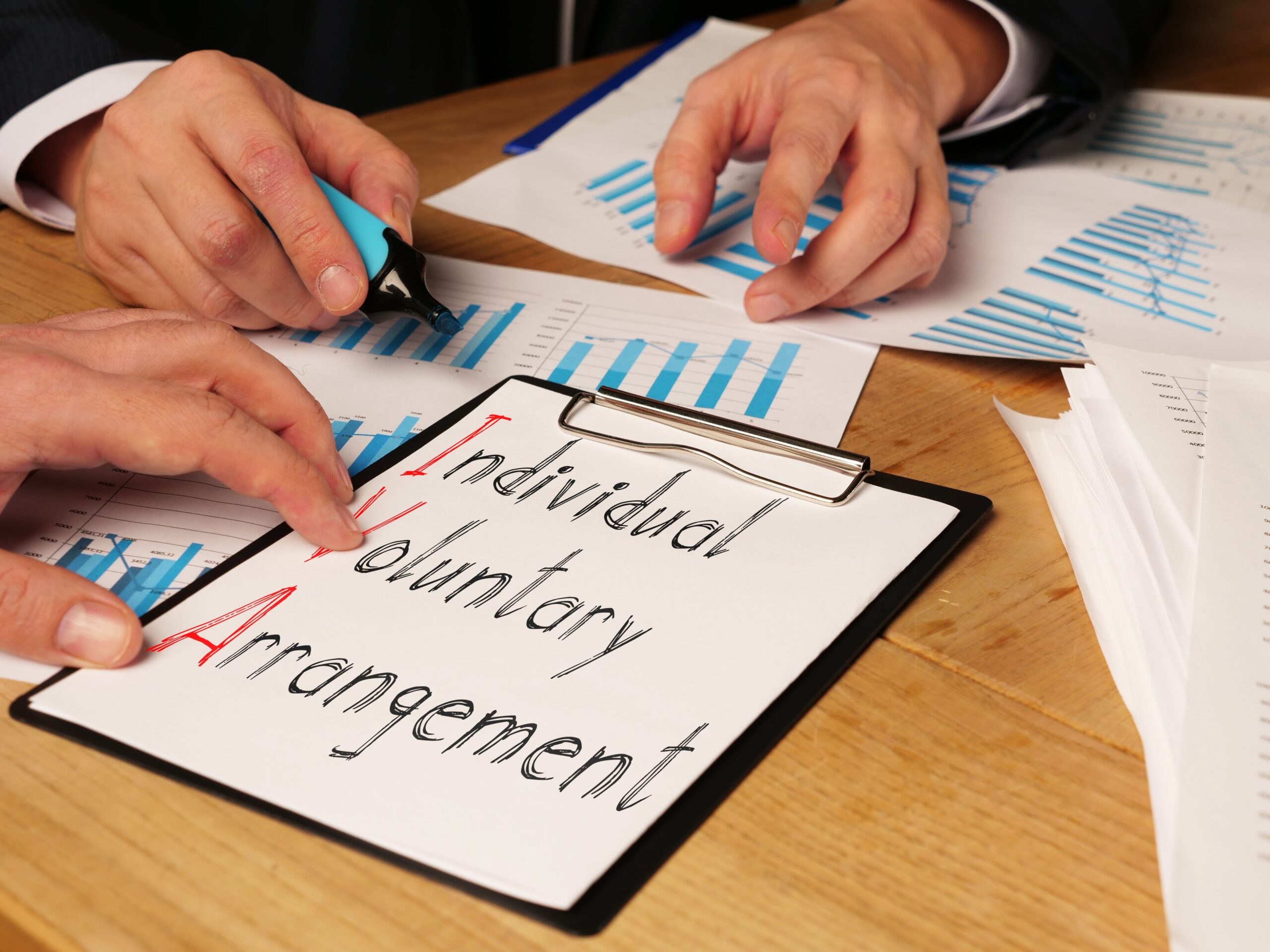
An IVA enables you to get your debts under control with one affordable monthly payment. At the and of the agreement, any unpaid balances are written off. You can then move on with your life, debt free.
Included in this article:
- What is an IVA?
- How long does the agreement last?
- Who can use this type of debt solution?
- How much will your payments be?
- How do you start an IVA?
- Will your IVA payments ever change?
- What happens to your credit rating?
Want to start an IVA? We can help. Give us a call (0800 077 6180) or complete the form below. The advice is free and confidential
What is an IVA?
An IVA (Individual Voluntary Arrangement) is an agreement with your creditors to reduce your monthly debt payments down to a single affordable amount.
It normally lasts for 5-6 years. Once you have completed all your payments, any remaining debt is written off. You are then debt free.
You may be able to write off a significant amount of your debt with an IVA. However, there is no guaranteed amount by which it will reduce. It depends on your individual personal circumstances and what you can afford to pay back each month.
You will not have to pay anything upfront to start the Arrangement. Once its in place, fees are deducted from your monthly payment. In most cases, you will not have to pay any extra to cover the cost of the agreement.
The Arrangement is legally binding on your creditors. This means that once it is in place, they most stop all collection activities against you. They can’t use bailiffs and if you are a home owner, they can’t secure their debt against your property.
Struggling to get your head round all of this? We can help. Call us (0800 077 6180) or complete the form below. The advice is free and confidential.
How long does an IVA last?
Most IVA agreements are based around you making an affordable monthly payment. As standard, the payments last for 5 years (60 months). However, it is possible that your creditors will demand you pay for 6 years (72 months).
Once it has started, your Arrangement can be extended. Typically this will happen if you miss payments for some reason. You will have to catch up with any missed payments by paying them at the end. Your agreement will therefore last longer.
The agreement will also last longer if you your income falls and it is agreed that you can reduce your payments. Such a reduction will almost certainly go hand in hand with an extension of the Arrangement for an addition 1-2 years.
You could reduce the time your IVA lasts by settling it early. The way this works is that someone you know pays a cash lump sum on your behalf. You can then stop your monthly payments and the Arrangement is completed.
The amount needed to pay your IVA early is usually equivalent to the number of remaining months multiplied by the monthly payment you make.
It is possible to do an IVA without any monthly payments at all. Instead, you pay a single cash lump sum up front.
Who can use this type of debt solution?
Anyone who lives in England or Wales can consider starting an IVA. It is not an option if you live Scotland.
You can also start an Arrangement if you have debt in the UK but have now moved abroad. Normally the option is only available for 3 years from the date you moved, but it can be longer in some cases.
The solution is available whether you are a home owner or live in rented accommodation.
A significant benefit if you own your property is that creditors are no longer allowed to secure their debt against your home. However, you may have to agree to release some equity from your property to increase the amount of your debt you pay back.
You can be employed, self employed or a company director and even use this solution if your only income is benefits.
You can include almost all types of unsecured debts in your Arrangement. Even benefits and utility bill arrears. It is also possible to include money owed to HMRC. As such, it can be a good option if you are self employed and have tax or VAT arrears.
How much will your IVA payments be?
The amount you pay into your IVA each month must be affordable. It is based on your surplus (or disposable) income. But how do you calculate what this amount is? First, you need to complete an income and expenses budget.
Add up all of your (or your household’s) income. Include all the benefits payments or maintenance you receive (although PIP and DLA payments are not normally taken into account).
Then list all your monthly expenditures. Our expenses guide will give you a good idea of the types of expenditures you should think about. Click on this link to download a free copy: Living Expenses Guide
Once you have your total monthly income and living expenses figures, simply subtract one from the other. The money you are left with is your surplus income. Your IVA payment will be this amount.
You have to pay 100% of your surplus income into your IVA each month.
As a rule of thumb, you should only start an IVA if you can afford to pay at least £100/mth into it.
How do you start an IVA
You have to go through a number of steps to get an IVA. These normally take around 4 weeks to complete.
Firstly, you will need to complete a summary of your financial circumstances. It primarily includes information about your debts, income, expenses and assets. We will help you complete this document.
You will then need to provide various documentation to prove the information you provided in your financial summary. This will generally include things like:
– Proof of your ID (copy of passport or driving license
– Balance confirmation for each creditor (recent statement or collection letter)
– Your last 3 months bank statements and wage slips
– Tax returns for the past 2 years if self employed
– Any car finance agreement
– Your latest mortgage statement (if you are a home owner)
Once your documents are collated, a formal proposal document containing your information is drafted and signed off by an Insolvency Practitioner. After that, you sign the proposal and a copy is then forwarded to each of your creditors.
As long as 75% of your creditors (by value) agree, your IVA is accepted and becomes legally binding on them. You then start making the monthly payments as agreed.
We will help you start your IVA. Give us a call (0800 077 6180) or complete the form below. The advice is free and confidential.
Will your IVA payments ever change?
Once your IVA is agreed and on place, the monthly payments you make are not fixed. They can change. More often than not, they will go up. But they could also go down.
Here are some common reasons why your payments might increase during the agreement:
Overtime payments
You can earn up to 10% of your normal take home salary in any particular month in overtime or bonus payments. This will be yours to keep. However, 50% of anything more will have to be paid into your Arrangement.
It is important that you tell your IVA company within 14 days of receiving any extra overtime payments. They will tell you how much of this you have to give them.
Paying extra into your IVA like this does not mean you will complete it sooner. You will still have the same number of payments to go. It simply means you will repay more of your debt back overall. The amount written off will be reduced.
Pay Rise
When your income goes up due to a pay rise or increase in your benefits payments, you must tell your IVA company within 14 days. They will ask you to submit a reviewed income and expenses budget.
Where your surplus income has gone up, your monthly IVA payment will be increased by 50% of this amount.
In the same way as overtime payments, this will not reduce the length of your Arrangement. It simply means you will end up repaying more of your original debt.
It might be possible to reduce your monthly payments if your income falls or you have a specific increase in your living expenses. However, where this is agreed, between 12-24 additional payments will be added to your Arrangement to compensate.
What happens to your credit rating if you do an IVA?
When you start your IVA, a record of the agreement will be added to your credit file. This will make your credit rating poor.
You will find it difficult to get new credit agreements. This will include being able to get a car on finance and possible a new mobile phone contract.
The record of your IVA will stay on your credit file (and its negative affect on your credit rating will remain) for 6 years. This is regardless of when the agreement ends. So if it IVA finishes after 5 years, your credit rating will still be negatively affected for a further 12 months.
Your credit rating will automatically start to improve after the 6th year anniversary of your Arrangement. As a result, you will be able to borrow again if you wish.
With the appropriate assistance you will then be able to get a mortgage from a high street lender
We can help you start an IVA. Call us (0800 077 6180) or complete the form below. The advice is free and confidential.
Arrange a call with an IVA Expert
Privacy Policy
Your information will be held in strictest confidence and used to contact you by our internal team only. We will never share your details with any third party without your permission.


